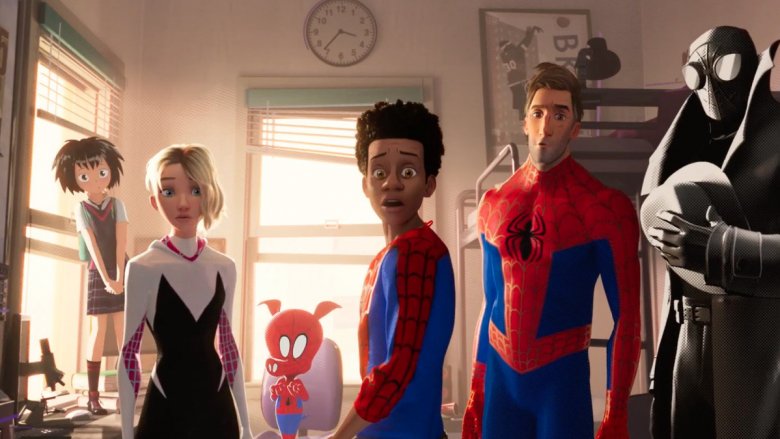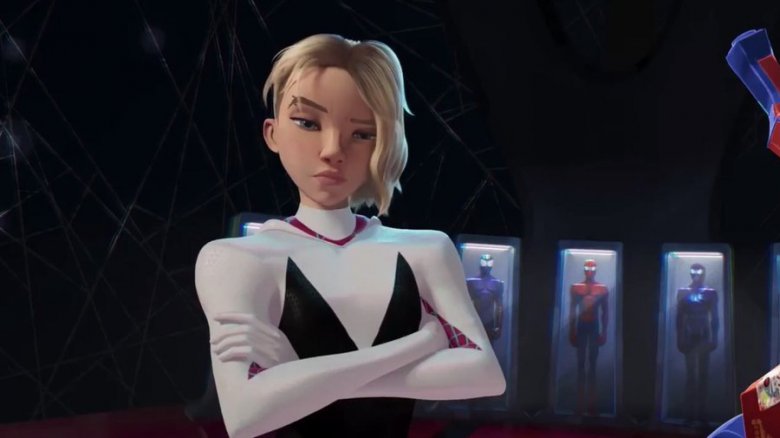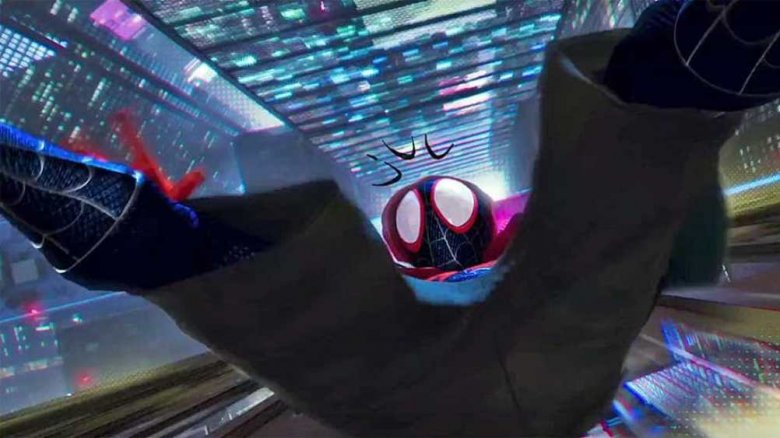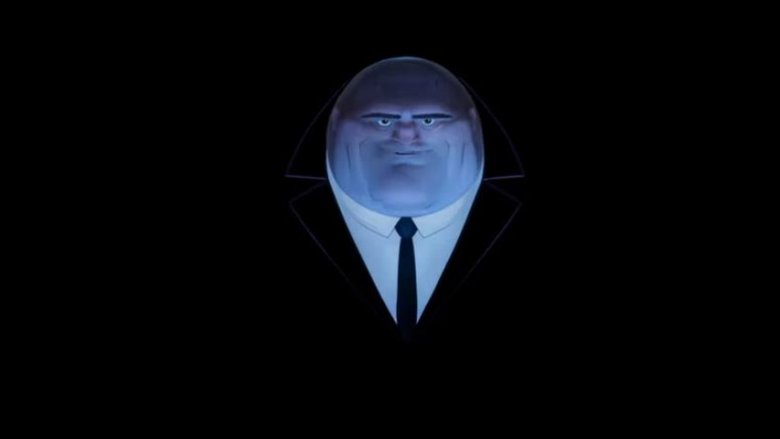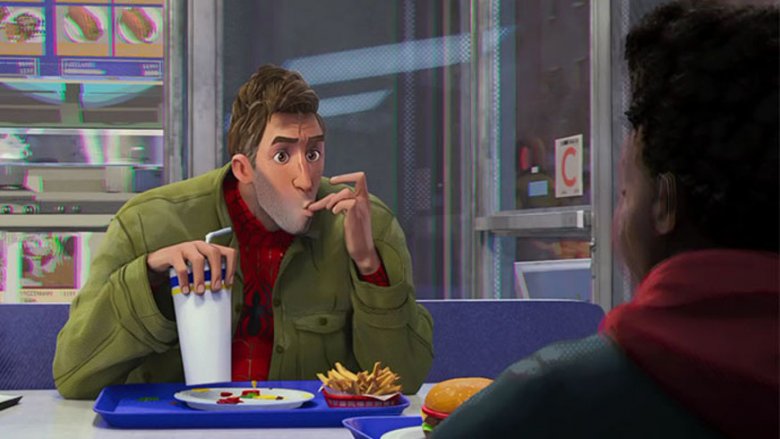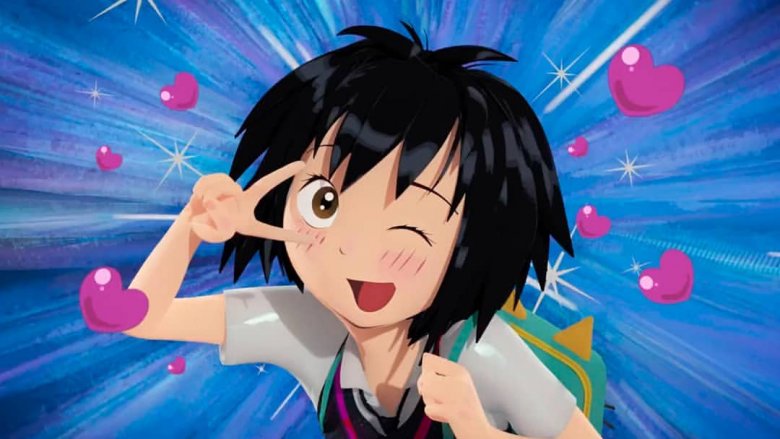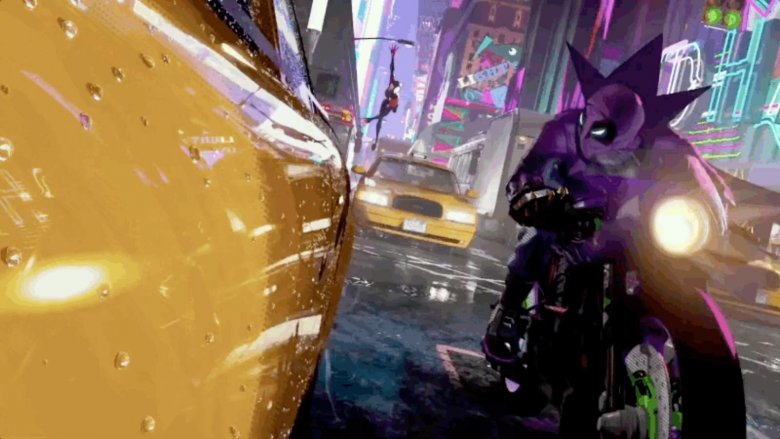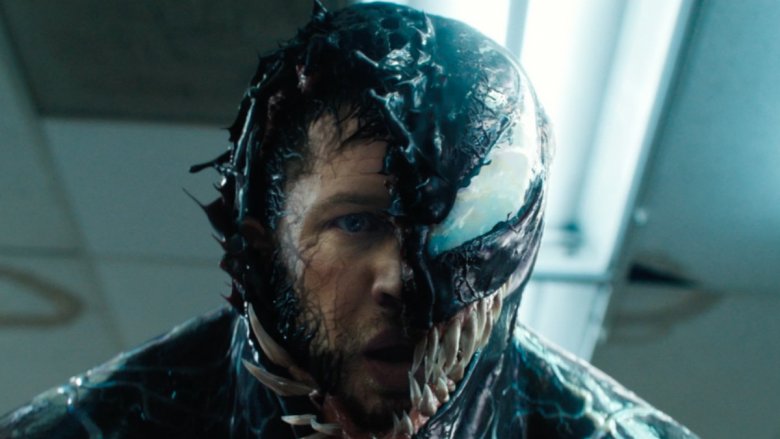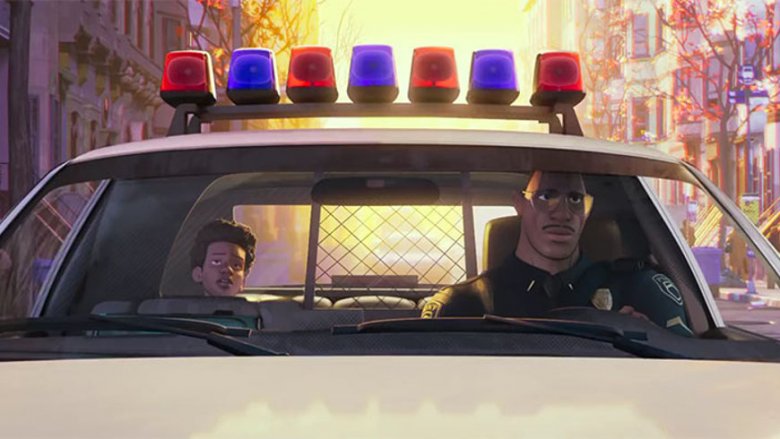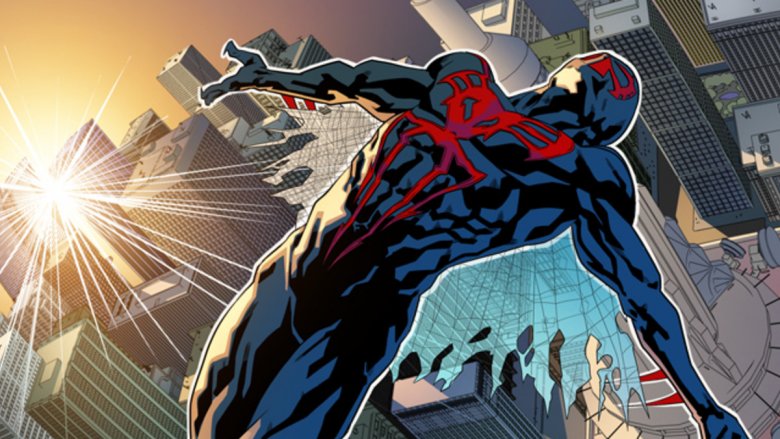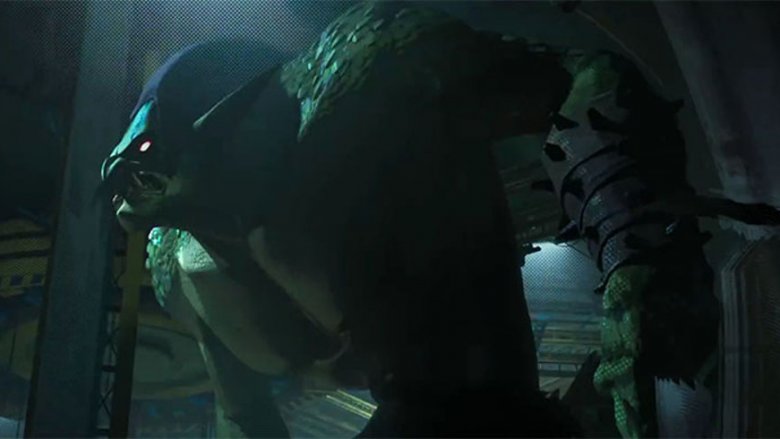Spider-Man: Into The Spider-Verse's Ending Explained
Spider-Man: Into the Spider-Verse has finally arrived in theaters, giving us all a chance to finally dig into one of the most anticipated movies of the year. Yes, it's a family film, but even among superhero movies Into the Spider-Verse is a particularly complex beast, blending a massive cast of characters with different animation styles, multiple villains, and a plot line that hops dimensions. That means there are a lot of moving parts to deal with even after the film wraps everything up with its thrilling finale. If you're still juggling all of those bits in your head trying to hold it all together, we're here to help.
What does the future hold for Miles Morales (Shameik Moore) and Peter Parker (Jake Johnson)? Where will the world of this film take its characters next with a sequel on the way? What's up with that post-credits scene? It's time to talk the ending of Spider-Man: Into the Spider-Verse.
Oh, and SPOILERS AHEAD.
An interdimensional relationship
From the moment she's revealed as a Spider-hero in the film, Gwen Stacy (Hailee Steinfeld) makes it clear that she's not interested in making friends. In her universe, her closest friendship was with Peter Parker, and it got him killed, so she doesn't want to get close to anyone ever again. That, of course, changes over the course of the film, and by the end she's definitely interested in a friendship — and perhaps more — with Miles Morales. The film tells us this by not just having Gwen look back fondly on her time in Miles' universe, but by also revealing that she's found a way to keep the lines of communication open between them. Yes, even across universes, Gwen and Miles can talk to each other. The film doesn't take the time at the end to explain why or how this is happening, but it's the most obvious setup for a reunion of the Spider-gang in the inevitable sequel. Yes, it signals that the experience of the film has opened Gwen up to new experiences and relationship, but it also signals that barriers between dimensions are perhaps quite a bit flimsier than they used to be thanks to Kingpin's particle accelerator meddling.
Spider-Man the artist
Miles Morales learns throughout the film that he can't just be Spider-Man in some kind of magic, automatic way. He has to take the leap of faith and become Spider-Man, and to do that he has to invent his own idea of what Spider-Man is to him. We see this in a thrilling sequence in which, with the help of Aunt May (who definitely won't be going away even though her universe's Peter is gone), he creates his own Spider-suit and heads out into the world with his own unique look and outlook on battling evil. This is in part because of the lessons he's learned along the way, but also because of Miles' own passion for creativity and street art. In the final moments of the film, we see that he's continued his street art tradition both as Miles and as Spider-Man, making his mark on New York in a way no other Spider-Man has. As Spider-Man, he's doing this in more secretive ways, but as Miles he's leaving it in tribute to his late uncle. In the future there's a good chance we will see a merging of both, as Miles furthers his art and his crimefighting in a kind of joint community service. He can't help but create. It's in his blood, and that's what makes him a unique version of Spider-Man.
The Kingpin of prison
In the end, Miles carries on the long tradition of refusing to kill his nemesis, and instead turns Kingpin (Liev Schreiber) over to the authorities even after the supervillain killed both his universe's Peter Parker and his uncle Aaron, a.k.a. the Prowler (Mahershala Ali). We know two things about this universe's Kingpin for sure: He has considerable resources, and he is absolutely relentless in his pursuit of getting what he wants, which in this case is a reunion with his late wife and son. The latter pursuit might be lost to him, but if Kingpin needs something to fight for now, he has it in the form of his freedom and vengeance against a new Spider-Man. Comics and TV fans know that Kingpin can't be stopped by prison bars, and it's easy to imagine this version of the character sitting in his cell and stewing over how another Spider-Man could have risen up so quickly even after he'd killed the old one. Make no mistake that, regardless of who the villain is in the sequel, this version of Kingpin will be sitting in jail, watching the new Spidey's exploits on the news and waiting for the day when he'll be able to wring his neck.
Peter Parker redeemed
Into the Spider-Verse is largely Miles' story, and it's the story of how he learns to believe in himself as a hero, and how learning he's not alone motivates him to become a better person and a better Spider-Man. He's not the only one who learns that lesson, though. In teaching Miles how to use his powers and how to truly become Spider-Man, Peter B. Parker also re-learns the lessons of great power and great responsibility that he had to internalize all those years ago. When we first meet him, he's a Spider-Man on auto-pilot, shrugging his way through crimefighting because that's what he's always done, while his personal life is in shambles. In meeting Miles, he finds an opportunity to teach and to learn, and by the time he returns to his home universe he's a changed man. We see him ring Mary Jane Watson's (Zoe Kravitz) doorbell at the end of the film, signaling that he's about to try and be a part of her life again, and while we know from decades of Spider-Man comics that the road to reconciliation might not be easy, this version of Peter has re-learned an important truth about himself: He always gets back up.
Peni Parker rebuilds
Into the Spider-Verse's final battle is a largely triumphant one for our Spider-heroes, but there is one key casualty along the way: SP//dr, Peni Parker's (Kimiko Glenn) beloved robot, which she pilots through a psychic link with her radioactive spider pal. Though we know it's technically only a machine, watching SP//dr go down in the fight is a legitimately sad moment, particularly since we know Peni's journey to becoming a hero has already meant losing her father along the way. Peni returns to her universe knowing she's helped save reality, though, and she does it with her radioactive spider friend still very much alive, resting on her shoulder as they prepare to journey home. We know thanks to Miles and Gwen that the lines of communication between universes remain open, which means we probably haven't seen the last of Peni. We also know Peni is something of a tech wizard. Those two factors combined probably mean SP//dr 2.0 isn't far away.
The legacy of Prowler
Part of Miles' Morales journey to being Spider-Man, like all of his new friends' journeys, involves a terrible loss. In his case it's his Uncle Aaron, who he loses metaphorically when he discovers his uncle is the Prowler — and loses literally when Kingpin kills Prowler for refusing to take his nephew's life. In the short term, as the film winds down, we see the impact Aaron's death has on both Miles and his father (Aaron's brother) Jefferson (Brian Tyree Henry), but we have yet to see the long-term legacy of Prowler and his death. We don't yet know exactly how he came to work for Kingpin, how deep he got, or how far his knowledge reached. For all we know right now, Miles and Jefferson (independent of each other since Jefferson doesn't yet know his son is Spider-Man) could use Aaron's knowledge of the underworld to infiltrate it even deeper, which could play a big role in Kingpin's trial. That information could also work both ways, since Kingpin may know full well (or could easily learn) who Aaron was close to in civilian life. If Miles isn't careful, his uncle's legacy could be an in-road for Kingpin to find out who this new Spider-Man really is.
Venom: Into the Spider-Verse
A couple of months before Into the Spider-Verse hit theaters, Sony released another film based on a Marvel Comics character with a very close Spider-Man connection: Venom, the runaway hit starring Tom Hardy. Venom included two post-credits scenes, one of which seemingly had nothing to do with the film we'd just seen, but was instead just an extended clip to promote Into the Spider-Verse. It was a fun piece of cross-promotion, but it included an important title card telling us that the upcoming animated film was taking place "in another part of the Spider-Verse," which means Venom is indeed part of the Spider-Verse. As far as we know from Venom itself, there is no Spider-Man in that particular world just yet, but the characters are connected so closely through Marvel Comics lore that Venom exists in the same multiverse that gave us these versions of Miles, Peter, Gwen, and the rest of the gang. That means that Tom Hardy's Venom could show up in future installments of the Spider-Verse franchise, which would be a truly wild crossover indeed.
Miles and his parents
Miles' father Jefferson is a police officer who views Spider-Man as a menace, until he sees the new Spider-Man in action at the end of the film and realizes the webslinger is on the side of right. His very vocal change of heart during the final battle is one of the things that pushes Miles to his limit and allows him to defeat Kingpin, something Miles repays when the dust has settled by giving Jefferson a big hug and saying (in a somewhat disguised voice) "I love you." It's a big emotional payoff in the film, giving Miles the opportunity to covertly tell his father what he's been holding back, but it also could be the new Spider-Man tipping his hand a little bit. At some point in the future, Spider-Man and Jefferson are bound to cross paths again as part of their mutual crimefighting endeavors, and now that Jefferson is a Spidey fan he may start following the exploits of this new webslinger more closely. If that's the case, it might not be long before Miles is outed as Spider-Man to his parents, whether accidentally or through a deliberate "we need to talk" revelation.
Meanwhile in 2099...
The film's post-credits scene reveals yet another Spider-hero, as we see a costumed figure named Miguel (Oscar Isaac) monitoring the dimensional crisis from afar, only to eventually jump in himself and get in an argument with the Spider-Man from the 1967 animated series. The Miguel in question is Miguel O'Hara, a.k.a. Spider-Man 2099. This Spider-Man first appeared in Marvel Comics in 1992, and his appearance in the Spider-Verse could prove very interesting in future installments. He's a child prodigy and brilliant geneticist working for Alchemax (the same corporation from the film that produced both Dr. Olivia Octavius and the spider which bit Miles) who, while trying to replicate Peter Parker's powers, accidentally merges his own DNA with that of a spider and becomes a Spider-Man in his own right. In his original comic book incarnation, Miguel is a hero from the future of the main Marvel Universe. It's not clear in the film if he's watching from Miles' future, from Peter's future, or from his own alternate reality. Whatever the case, he has the ability to dimension hop, which means he could show up alongside any of Into the Spider-Verse's heroes at a moment's notice. Keep an eye out for him in the sequel.
The next villain
In the end, Miles Morales is able to send all of his friends back home and defeat the Big Bad of the film, Kingpin, but this is a superhero universe with a sequel on the way, so we know his version of New York City won't stay quiet for long, and we also know the filmmakers won't just sit back and reuse the same villain again so soon. Kingpin's not going anywhere, but it would be boring to yank him right back out of jail right away. So who will Miles fight the next time around? The list of possibilities is vast, of course, but the clear contender seems to be the Green Goblin, who shows up in this film for its first major fight scene but is ultimately relegated to a minor role. Into the Spider-Verse's version of the Goblin is unlike any we've seen on the big screen before, and the animation only scratches the surface of what could be done with him. Plus, in Marvel Comics, his alter ego Norman Osborn plays a key role in Alchemax, the corporation at the center of the film's plot. Don't be surprised if Norman, and by extension the Green Goblin, have a much larger role to play in the sequel.
